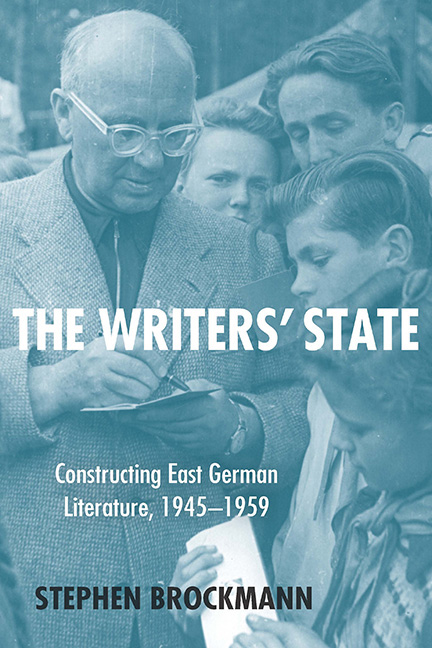Book contents
- Frontmatter
- Dedication
- Contents
- Acknowledgments
- Introduction: Reconstructing East German Literature
- Part I The Absence of State (1945)
- Part II Constructing the State (1949)
- 2 Brecht and the Battle of the Spirits, 1949
- 3 German Culture's Will to Power, 1949–50
- 4 Fascinating Fascists, 1949–50
- Part III Contesting the State (1953)
- Part IV The State Cracks Down (1956)
- Conclusion
- Selected Bibliography
- Index
3 - German Culture's Will to Power, 1949–50
from Part II - Constructing the State (1949)
Published online by Cambridge University Press: 05 February 2016
- Frontmatter
- Dedication
- Contents
- Acknowledgments
- Introduction: Reconstructing East German Literature
- Part I The Absence of State (1945)
- Part II Constructing the State (1949)
- 2 Brecht and the Battle of the Spirits, 1949
- 3 German Culture's Will to Power, 1949–50
- 4 Fascinating Fascists, 1949–50
- Part III Contesting the State (1953)
- Part IV The State Cracks Down (1956)
- Conclusion
- Selected Bibliography
- Index
Summary
THE YEAR BETWEEN JULY 1949 AND JULY 1950 witnessed a number of spectacular political, military, and cultural events in occupied Germany and elsewhere. In July and August of 1949 Germans on both sides of the Iron Curtain celebrated the two hundredth anniversary of Goethe's birth. In the Soviet zone there were two major celebrations, one at the beginning of August, when Thomas Mann, in Weimar to receive the city's Goethe Prize, gave the same speech he had given less than a week earlier in Frankfurt. In that speech Mann reminded his listeners of the bitter debate between Germany's “inner emigrants” and émigrés like himself, a debate that had occurred immediately after the end of the Second World War. With studied ingenuousness, the Nobel prizewinner proclaimed that the controversy “about my work and my person, which I gazed upon in amazement, far exceeds this unimportant person.” In point of fact, Mann had played an anything but “unimportant” role in the literary dust-up; and he had not simply “gazed upon” the controversy from the outside as a passive observer. Rather, he had taken part as an active participant, castigating “inner emigrants” for remaining in Hitler's Germany and thus, as he charged, helping to give Nazism a measure of apparent cultural legitimacy. Undoubtedly Mann was right when, describing the postwar acrimony in both Weimar and Frankfurt, he proclaimed: “This is not literary criticism any more. It is a fight between two ideas of Germany, a debate, merely occasioned by me, about the spiritual and moral future of the country.”
One of the primary goals that Johannes R. Becher had for the Kulturbund from 1945 onward was to end the battle between “inner emigrants” and literary émigrés such as Mann. He largely succeeded in this with the invitation to Mann in the summer of 1949. Mann's visit to Weimar essentially put an end to any further public controversy about the relative merit of literary emigration, and it constituted a major ideological triumph for the nascent socialist state. Mann later acknowledged in a New York Times article that his trip to the Soviet zone might “have been evaluated by the regime as ideological support.” The visiting writer was treated, in Mann's own words, as a “national hero and popular leader” and traversed “a long, triumphal road of noisy and jubilant popularity” (32).
- Type
- Chapter
- Information
- The Writers' StateConstructing East German Literature, 1945-1959, pp. 106 - 138Publisher: Boydell & BrewerPrint publication year: 2015



